The
straight seam steel pipe structure can adopt a circular pipe structure or a rectangular pipe structure according to the specific conditions of the component's stress, supply conditions, manufacturing and processing conditions, and cost, or a mixture of the two types of steel pipes. When mixed-use, generally the chord uses a rectangular tube, and the web uses a round tube; sometimes, the chord can also use I-shaped steel or H-shaped steel, and the web uses a rectangular or round tube. Tube cross-section Round tube Rectangular tube performance Applicable to axial force, bending, eccentric force Applicable to axial force and torsion members; axial compression and torsion members. The strength is higher when the axis is under tension. Good stability in mechanical properties Although local buckling is easy to occur when under pressure, but the strength after buckling can be used, the anti-hydrodynamic characteristics are more favorable, and the force is small and poor. Under the same cross-sectional area, the surface area is smaller and slightly larger. There are corners, anti-corrosion, and fire-resistant, corrosion-resistant, and fire-resistant without edges and corners; fire-resistant and anti-corrosion materials save a little more. Compared with structures made of open sections, steel can be saved by about 20% in industrial buildings, and up to half in tower structures.
How to clean straight seam steel pipe?
(1) We can use solvents or emulsions to clean the appearance of steel pipes. This method is very effective for oil and grease or dust and other organic substances that exist on the surface of steel pipes.
(2) For the rust on the surface of the steel pipe, we can use wire brushes and other things to polish the appearance of the steel pipe, to achieve the purpose of rust removal.
(3) The spraying method can also be used. Using this method not only can completely clean up rust, oxides, and dirt, but also the steel pipe can reach the required average under the impact of abrasive abrasives and the effect of friction. roughness.
The straight seam steel pipe is used to transfer fluid and powder, exchange heat and manufacture mechanical parts and containers, and what's more, it is a kind of economical steel. Using steel pipes to manufacture building structure grids, pillars, and mechanical supports can reduce weight, save 20-40% of metal, and realize factory-like mechanized construction. The use of steel pipes to manufacture highway bridges can not only save steel and simplify construction but also greatly reduce the area of the protective layer, saving investment and maintenance costs. Nowadays, we have a wide range of applications for steel pipes, but there will inevitably be rust in the process of using steel pipes. Rusty steel pipes will affect their normal use, so if you find that there is rust on steel pipes It needs to be cleaned up in time. After relevant comparative tests, it has been verified that the yield pressure of the straight seam steel pipe and the steel pipe are consistent with the measured and theoretical values of the burst pressure, and the deviation is close. But no matter the yield pressure or burst pressure, the straight seam steel pipe is lower than the steel pipe. The blasting test also shows that the circumferential deformation rate of the blasting port of the straight seam steel pipe is larger than that of the steel pipe. This proves that the plastic deformation ability of the straight seam steel pipe is better than that of the steel pipe, and the blasting opening is generally limited to one pitch, which is due to the strong restraint effect of the spiral weld on the expansion of the crack.
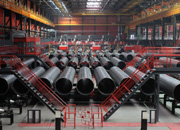 Threeway Steel is known as a professional supplier engaged in manufacturing and distributing a wide range of steel pipe, and our headquarter located the central part of China – Hunan and six associated factories throughout China.
Threeway Steel is known as a professional supplier engaged in manufacturing and distributing a wide range of steel pipe, and our headquarter located the central part of China – Hunan and six associated factories throughout China.
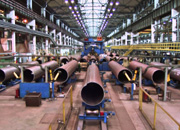 Threeway Steel is known as a professional supplier engaged in designing, manufacturing and distribution of a wide range of steel products with the headquarter located the central part of China – Hunan and six associated factories throughout China.
Threeway Steel is known as a professional supplier engaged in designing, manufacturing and distribution of a wide range of steel products with the headquarter located the central part of China – Hunan and six associated factories throughout China.
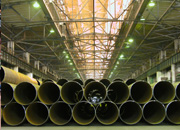 Threeway Steel is known as a professional supplier engaged in designing, manufacturing and distribution of a wide range of steel products with the headquarter located the central part of China – Hunan and six associated factories throughout China.
Threeway Steel is known as a professional supplier engaged in designing, manufacturing and distribution of a wide range of steel products with the headquarter located the central part of China – Hunan and six associated factories throughout China.
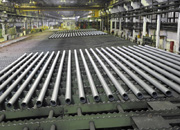 Threeway Steel is known as a professional supplier engaged in designing, manufacturing and distribution of a wide range of steel products with the headquarter located the central part of China – Hunan and six associated factories throughout China.
Threeway Steel is known as a professional supplier engaged in designing, manufacturing and distribution of a wide range of steel products with the headquarter located the central part of China – Hunan and six associated factories throughout China.
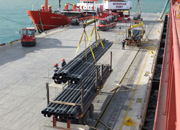 Threeway Steel is known as a professional supplier engaged in designing, manufacturing and distribution of a wide range of steel products with the headquarter located the central part of China – Hunan and six associated factories throughout China.
Threeway Steel is known as a professional supplier engaged in designing, manufacturing and distribution of a wide range of steel products with the headquarter located the central part of China – Hunan and six associated factories throughout China.

